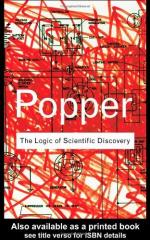
|
| Name: _________________________ | Period: ___________________ |
This test consists of 15 multiple choice questions and 5 short answer questions.
Multiple Choice Questions
1. According to Popper, what takes the place of strict laws in atomic science?
(a) Theory.
(b) Probability.
(c) Hypothesis.
(d) Logic.
2. In order to validate his theory, what does Popper categorize regarding frequency theory?
(a) Random sequences.
(b) Finite sequences.
(c) Continuing sequences.
(d) Alternative sequences.
3. What do some researchers suggest occurs when the probability is paired with testability?
(a) Probability increases.
(b) Both remain equal.
(c) Probability decreases.
(d) Probability is eliminated.
4. If a system is protected what will its degree of falsifiability be equal to?
(a) 2.
(b) -1.
(c) 0.
(d) 1.
5. What does Popper feel about the scientific characteristic of nature?
(a) He opposes them.
(b) He challenges them.
(c) He supports them.
(d) He ignores them.
6. What are hypothetical estimates of frequency?
(a) Finite sequences.
(b) Random sequences.
(c) Alternative sequences.
(d) Infinite sequences.
7. What has a limited utility in comparing falsifiers?
(a) Sub-classes.
(b) Sub-dimensions.
(c) Sub-justifications.
(d) Sub-tests.
8. What leads to scientific advances?
(a) The quest for knowledge.
(b) Creating hypotheses.
(c) Proving theories are invalid.
(d) The passion for knowledge.
9. What does Popper feel closes off areas of research?
(a) Attempts to demonstrate the wave theory.
(b) Attempts to demonstrate the uncertainty principle.
(c) Attempts to demonstrate the particle formula.
(d) Attempts to demonstrate statistical scatter relations.
10. What does Popper thinks about Wittgenstein, Schlick, and Feigl's thoughts on simplicity as a basic law?
(a) It should include probability.
(b) It misses crucial points.
(c) It fully explains the law.
(d) It cannot be tested.
11. What view of probability depends on inductive logic?
(a) Hypothetical view.
(b) Inductive view.
(c) Naturalistic view.
(d) Deductive view.
12. What plays a vitally important role in empirical science?
(a) Inferences.
(b) Research.
(c) Simplicity.
(d) Probability.
13. What is Feigl's reasoning to the motion of simplicity?
(a) It reveals more empirical content.
(b) It can be better tested.
(c) It can be better justified.
(d) It appeals to the economy of thought.
14. What does Popper equate simplicity with?
(a) Falsifiability.
(b) Conventionalism.
(c) Empiricism.
(d) Psychology.
15. What is used to make laws based on observations?
(a) Probability.
(b) Theory.
(c) Simplicity.
(d) Conventionalism.
Short Answer Questions
1. What principle does science presuppose?
2. By seeking the highest degree of universality and precision, what type of content results?
3. How does Popper explain the differences in his selection process?
4. What, according to von Mises, is derived from certain initial probabilities and distributions?
5. What is the result, according to Popper, when inductive logic is used?
|
This section contains 399 words (approx. 2 pages at 300 words per page) |

|




